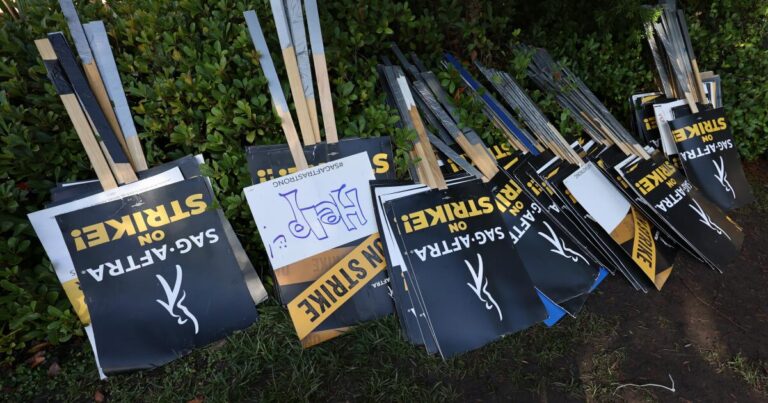After months of strikes by the writers’ and actors’ unions—and billions of {dollars} in losses to California’s economic system—Hollywood is again to work. In a manner. We nonetheless want the SAG-AFTRA membership to ratify the hard-fought settlement for the tv and movie business to proceed its post-pandemic restoration.
Just like the Writers Guild of America, the Display screen Actors Guild-American Federation of Tv and Radio Actors efficiently negotiated very vital will increase in revenue streams for its members, together with vital enhancements in residuals from streaming. That is nice stuff, however just about what you’d count on from efficient, strike-forced collective bargaining.
The extra attention-grabbing — and doubtlessly extra vital — a part of the SAG-AFTRA deal is what was achieved for actors associated to the usage of synthetic intelligence within the movie business.
Producers got here into the negotiations refusing to debate AI in any respect. Some individuals took it as an indication that the film studios had a secret grasp plan for the usage of synthetic intelligence to interchange actors. The worry now’s that SAG-AFTRA has agreed to an settlement that might permit the studios to implement the sinister plan.
The higher guess is that, within the first place, the studios simply did not need any of the attainable enterprise alternatives associated to AI – not absolutely understood – to be restricted by a collective settlement. However limitation is what each the WGA and SAG-AFTRA achieved, particularly the actors’ union.
The AI provisions in SAG-AFTRA’s settlement give performing artists substantial management over the creation and particular use of their digital replicas. The settlement requires the human actor to be paid for the variety of days the actor would have labored for all appearances of the replicant within the movie or TV present. It entitles the human actor to full residuals for the digital copy’s performances, and it requires that consent be obtained in a transparent, knowledgeable, particular manner, not hidden deep within the positive print of some prolonged contract.
That is a variety of flexibility the studios have given up, and in the event you’re aware of the required funds, the entire construction removes a lot of the motivation to interchange human actors with digital replicas. If producers are going to pay the human actors for the times they might have labored anyway, and likewise pay residuals, why go to the expense of the digital copy?
Actress Justine Bateman has mentioned some fairly inflammatory stuff about these provisions, however from a lawyer’s standpoint, most of her feedback don’t match the main points which were made public. Bateman, who has prompt actors solely ratify the contract “if they do not need to work anymore,” is true that the deal would not appear to ban studios from creating utterly artificial performers, however they have been doing it (at the very least visually) for a very long time. It is referred to as animation.
Sure, at some point there is likely to be a remake of “Who Framed Roger Rabbit” the place Jessica Rabbit is an artificial, humanoid cross between Barbie (not Margot Robbie, however a real Barbie) and Miss Universe, however the studios would by no means comply with rule out that manufacturing (and artistic) choice.
Critics of the settlement have additionally complained that the AI provisions revolve round good religion, as if that had been a selected flaw on this settlement. Information flash: All contractual agreements, all laws, all worldwide treaties – all types of human settlement on future conduct – require implementation in good religion.
And everybody ought to perceive that the studios solely made a take care of SAG-AFTRA when the actors’ union had probably the most leverage attainable, which helps the case that the union obtained a really, superb contract.
When the United Auto Employees struck choose auto vegetation this 12 months, automakers felt it: Vendor inventories of widespread fashions fell mainly in a couple of weeks of the beginning of the strike. However when actors hit the Hollywood studios, a special economic system got here into play. Out of the blue, all manufacturing prices for every studio stopped. In the meantime, income from field workplace and streaming providers continued (all the key studios have one, besides Sony). The research was short-term money queues for his or her company conglomerates. Why hassle speaking to the actors when the rapid funds seemed so rosy?
The strain on the studios solely elevated when the 2024 movie started to be threatened, and most significantly, the promotional efforts for the 2023 movie from the vacation season had been in jeopardy. SAG-AFTRA guidelines prohibit members from selling their movies throughout a strike. And if Jason Momoa and crew weren’t obtainable to advertise “Aquaman and the Misplaced Kingdom” right here and overseas, Warner Bros. quite a bit of revenue. The identical with the celebs wanted to advertise “Wonka,” “Maestro” and plenty of different November and December releases. Earlier than the pandemic, home field workplace receipts for the 2019 vacation season was $2.1 billion; the studios did not need their effort rebuild that money workplace enterprise completely derailed by an ongoing participant strike.
If the union and producers hadn’t settled down once they did, the union’s most leverage would have disappeared and the strike may simply have continued into the primary or second quarter of 2024, with really debilitating outcomes for the US leisure business and for California basically .
So did SAG-AFTRA get deal? Sure, it did – and never only for actors. As a ground-breaking settlement the place employers have agreed to phrases and situations the place employees should consent to the creation and use of digital substitutes – and folks proceed to be paid when such substitution happens – SAG-AFTRA has in all probability obtained us coated all.
Justin Hughes teaches mental property and business legislation at Loyola Regulation Faculty and was America’s Chief Negotiator of 2012 Beijing Treaty on Audiovisual Performancesthe Multilateral Treaty on the Safety of Display screen Actors.

